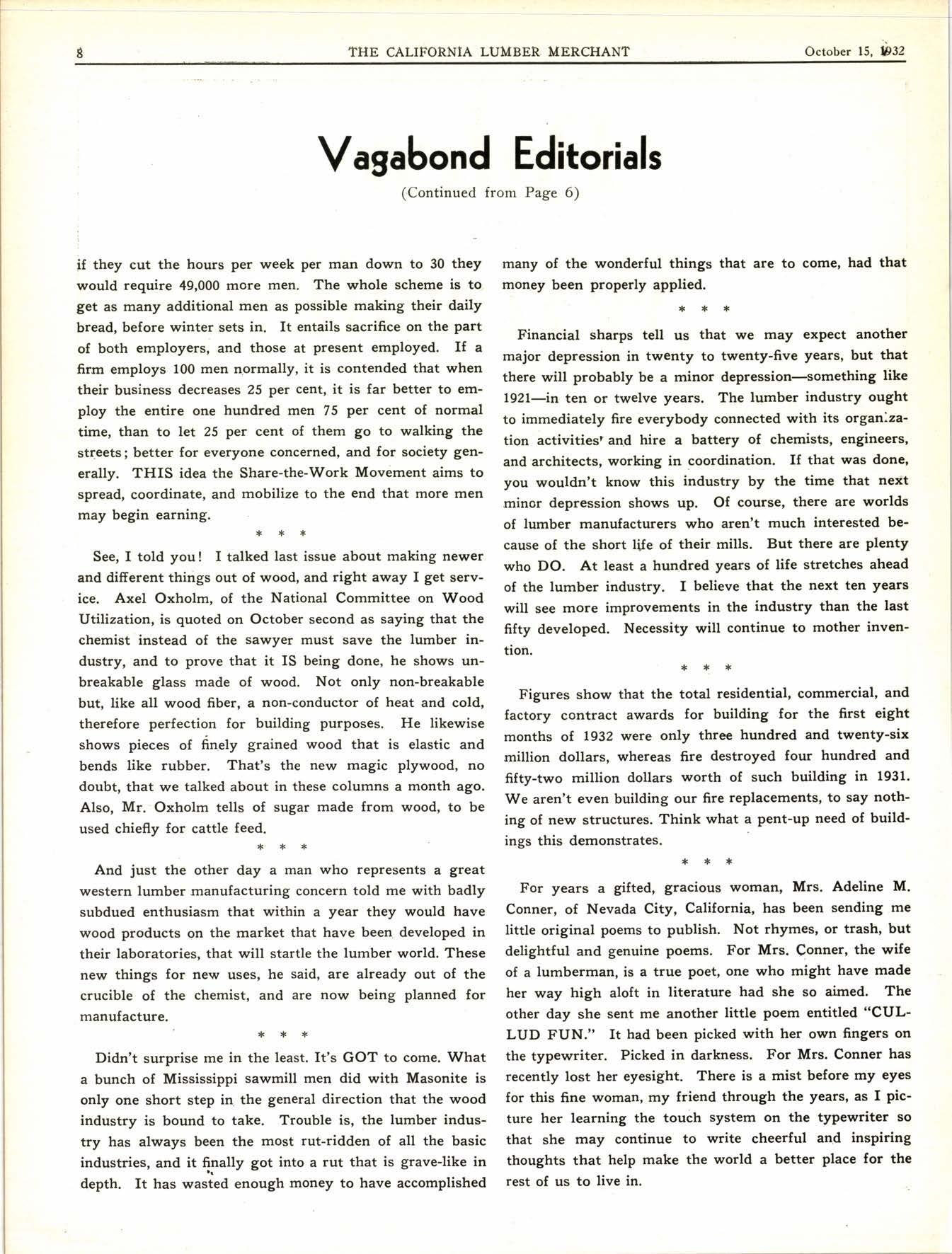
3 minute read
Vagabond Editorials
(Continued from Page 6) if they cut the hours per week per man down to 30 they would require 49,000 more men. The whole scheme is to get as many additional men as possible making their daily bread, before winter sets in. It entails sacrifice on the part of both employers, and those at present employed. If a firm employs 1(X) men nprmally, it is contended that when their business decreases 25 per cent, it is far better to employ the entire one hundred men 75 per cent of normal time, than to let 25 per cent of them go to walking the streets; better for everyone concerned, and for society generally. THIS idea the Share-the-Work Movement aims to spread, coordinate, and mobilize to the end that more men may begin earning. see, r told you! I talk; ,I",i".rl" about making newer and different things out of wood, and right away I get service. Axel Oxholm, of the National Committee on Wood Utilization, is quoted on October second as saying that the chemist instead of the sauryer must save the lumber industry, and to prove that it IS being done, he shows unbreakable glass made of wood. Not only non-breakable but, like all wood fiber, a non-conductor of heat and cold, therefore perfection for building purposes. He likewise shows pieces of finely grained wood that is elastic and bends like rubber. That's the new magic plywood, no doubt, that we talked about in these columns a month ago. Also, Mr. Oxholm tells of sugar made from wood, to be used chiefly for cattle feed.
And just the other a.; " *J,, who represents a great western lumber manufacturing concern told me with badly subdued enthusiasm that within a year they would have wood products on the market that have been developed in their laboratories, that will startle the lumber world. These new things for new uses, he said, are already out of the crucible of the chemist, and are now being planned for manufacture.
Didn't surprise me in a* ,*ra It's GOT to come. What a bunch of Mississippi sawmill men did with Masonite is only one short step in, the general direction that the wood industry is bound to take. Trouble is, the lumber industry has always been the most rut-ridden of all the basic industries, and it {nally got into a rut that is grave-like in depth. It has wasted enough money to have accomplished many of the wonderful things that are to come, had that money been properly applied.
Financial sharps *.u: ;"; "r" may expect another major depression in twenty to twenty-five years, but that there will probably be a minor depression-something like 1921-in ten or twelve years. The lumber industry ought to immediately fire everybody connected with its organ.zation activitiest and hire a battery of chemists, engineers, and architects, working in coordination. If that was done, you wouldn't know this industry by the time that next rninor depression shows up. Of course, there are worlds of lumber manufacturers who aren't much interested because of the short life of their mills. But there are plenty who DO. At least a hundred years of life stretches ahead of the lumber industry. I believe that the next ten years will see more improvements in the industry than the last fifty developed. Necessity will continue to mother invention'
:r :r r
Figures show that the totd residential, commercial, and factory contract awards for building for the first eight months of 1932 were only three hundred and twenty-six million dollars, whereas fire destroyed four hundred and fifty-two million dollars worth of such building in 1931. 'We aren't even building our fire replacements, to say nothing of new structures. Think what a pent-up need of buildings this demonstrates.
For years a gifted, ,t*r""r lto*"r1 Mrs. Adeline M. Conner, of Nevada City, California, has been sending me little original poems to publish. Not rhymes, or trash, but delightful and genuine poems. For Mrs. Conner, the wife of a lumberman, is a true poet, one who might have made her way high aloft in literature had she so airned. The other day she sent me another little poem entitled "CULLUD FUN." It had been picked with her own fingers on the typewriter. Picked in darkness. For Mrs. Conner has recently lost her eyesight. There is a mist before my eyes for this fine woman, my friend through the years, as I picture her learning the touch system on the typewriter so that she may continue to write cheerful and inspiring thoughts that help make the world a better place for the rest of us to live in.










